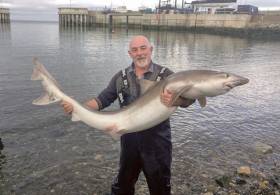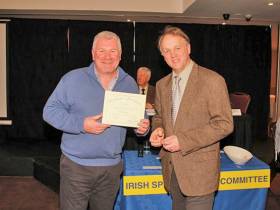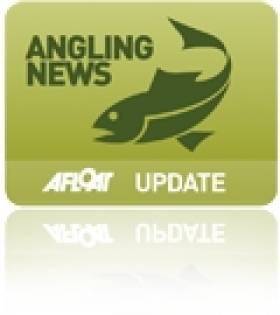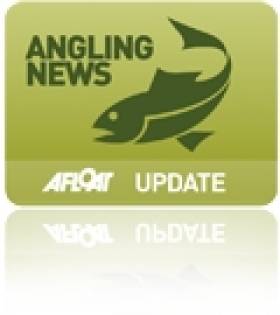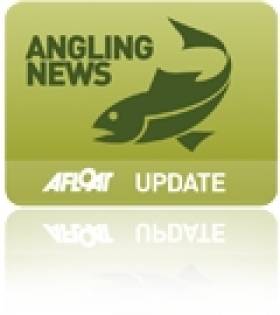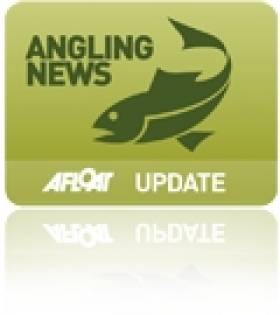Displaying items by tag: Irish Specimen Fish Committee
Unique ‘Atlas’ of Huge Fish Caught by Anglers in Ireland Now Available
A unique record of very large fish caught and released by anglers in Ireland over the past 60 years has just been published.
The 220-page Irish Specimen Fish Atlas covers 83 various species nationwide. It was compiled by the Irish Fish Specimen Committee and supported by Inland Fisheries Ireland (IFI).
The atlas presents information on the distribution and frequency of more than 27,000 individual specimen fish — about 420 per annum on average since 1955 — reflecting the quality of angling for distinctive large fish species in Ireland over time.
Dr William Roche, co-author and senior research officer with IFI said: “The Irish Specimen Fish Atlas offers a different insight into fish populations here, and shows where quality fish — of many distinctive species — can be caught by anglers in the productive waters within, and around, the island of Ireland.
“This accessible publication identifies many Irish waters where and when big fish have been, and are still being, caught.
 The A4 full-colour Irish Specimen Fish Atlas costs €29 including postage (for Ireland and NI) and is available to purchase from the Irish Specimen Fish Committee
The A4 full-colour Irish Specimen Fish Atlas costs €29 including postage (for Ireland and NI) and is available to purchase from the Irish Specimen Fish Committee
“But it also reveals a drop in numbers of large individual fish in about 40% of species. Some ‘newer’ ones such as thick-lipped mullet are improving, but more ‘traditional’ species, including cod and salmon, are in decline.
“The decrease in numbers of large fish of some species is concerning although not consistent across the board. The reasons for these declines are varied and complex. For commercial marine species, over-exploitation may be a factor. Non-commercial marine species are vulnerable to pressures such as being caught unintentionally as by-catch.
“Pressures on freshwater fish vary from catchment to catchment, and may include deterioration of water quality, the presence of dams and weirs, and reduced habitat quality.
“However, overall there are plenty of species providing quality specimen angling, and offering great scope for enjoyment of being outdoors and fishing on rivers, lakes and/or marine waters which characterise many parts of Ireland.”
The A4 full-colour Irish Specimen Fish Atlas is priced at €29 including postage (for Ireland and NI) and is available to purchase on the Irish Specimen Fish Committee website. For further details contact [email protected].
Over 470 ‘Exceptionally Large Fish’ Caught by Anglers Throughout Ireland in 2021, Irish Specimen Fish Committee Report Says
Angling enthusiasts fishing Irish waters caught hundreds of huge fish in 2021, according to the recently published Irish Specimen Fish Committee (ISFC) report.
One new Irish record was set by Jim Clohessy from Cork, who broke the existing record for a rare species, the stone basse, when fishing off Cork Harbour.
Over 470 exceptionally large fish of different species were caught by anglers from venues throughout Ireland in 2021. The main species were smaller shark species like spurdog and, in freshwater, tench, roach-bream hybrids and brown trout dominated. All fish were caught, weighed, measured and released.
Details of these fish and current Irish record fish are in the Irish Specimen Fish Committee Report 2021, which is now available to download from the ISFC website and in print from Inland Fisheries Ireland (IFI) offices around the country, free of charge.
The ISFC, which is supported by IFI, is an independent all-Ireland voluntary body which verifies and records the capture of large fish caught on rod by anglers in freshwater and marine waters.
The committee’s awards event, when anglers will be presented with their awards and certificates, will be held on Saturday 5 November at the Clayton Hotel in Leopardstown, Co Dublin.
Despite the COVID-19 pandemic, anglers fishing in Irish waters in 2020 caught hundreds of large fish — according to the latest Irish Specimen Fish Committee (ISFC) report.
One new record was set — for a 12.02kg smooth-hound hooked off Wicklow in July last year by Dublin angler John Hughes — and over 300 exceptionally large fish of different species were caught by anglers from venues throughout Ireland.
The main species were sharks like smooth-hound and spurdog while in freshwater, pike and brown trout dominated. All fish were caught, weighed, measured and released.
 Amy O’Brien with dad Sidney, winner of the Dr AEJ Went Award for Young Specimen Angler of the Year with her 1.02kg golden grey mullet
Amy O’Brien with dad Sidney, winner of the Dr AEJ Went Award for Young Specimen Angler of the Year with her 1.02kg golden grey mullet
Details of all these fish and current Irish record fish are in the Irish Specimen Fish Committee Report 2020, which has just been released and is available to download HERE. Hard copies will be available in mid-May.
The ISFC, which is supported by Inland Fisheries Ireland, is an independent all-Ireland voluntary body which verifies and records the capture of large fish caught on rod by anglers in freshwater and marine waters.
Four New Irish Record Fish Caught By Anglers During 2018
#Angling - Four new Irish record fish were caught by anglers last year, according to the just published Irish Specimen Fish Committee (ISFC) report for 2018.
New records were set for four marine species: golden grey mullet, thin-lipped mullet, black bream and tope.
The two mullet species were taken in Cork, with Noel Lane from Cork taking the 2.95kg thin-lipped mullet from Cork Harbour on 15 July, and Stephen O’Neill hooking the golden grey mullet of 1.52kg on 15 August.
Elsewhere, the 34.02kg tope was caught off Greystones, Co Wicklow by Stephen Hanway from Dublin on 3 October, and Kilmore Quay in Co Wexford was the venue for the 1.45kg black sea bream caught by Welsh angler Gordon Thornes on 17 September.
The anglers will be presented with their awards and certificates at the ISFC Awards Day on Saturday 16 February in conjunction with the Ireland Angling Show at the National Show Centre in Swords.
Further details of these record fish are in the Irish Specimen Fish Committee Report 2018. The committee, which is supported by Inland Fisheries Ireland, is an independent all-Ireland voluntary body which verifies and records the capture of large fish caught on rod by anglers in freshwater and marine waters.
As well as the new record, detailed information on 393 specimen fish (large fish) taken by anglers from venues throughout Ireland in 2018, comprising many different species, is detailed in the report.
The main species were smaller shark species like smooth hound and spurdog, while in freshwater, carp and pike dominated. All fish were caught, weighed, measured and released.
Hard copies of the report are available from Inland Fisheries Ireland offices nationally.
Specimen Fish Awards Kick Off 2016 Angling Season
#Angling - The number of successful young anglers collecting their specimen award certificates was the highlight of the Irish Specimen Fish Committee’s Awards Day on Friday 20 February.
Held in Dublin on the same weekend as the Ireland Angling Show 2016, both events were attended by large numbers of anglers from all over the country and abroad – such as Dutch angler Henk Thuelings, who travelled from the Netherlands to collect his specimen award for a large tope taken off Wicklow.
Record fish and specimen awards were presented, and for many anglers this full-on angling weekend is now a curtain-raiser for the forthcoming angling season.
Guest speaker Jim Clohessy, the well-known angler and TopFisher.eu angling magazine editor, spoke about specimen angling in Ireland and the value that anglers add to understanding about fish and their status in Irish waters through claiming specimen fish.
In his review, ISFC chair Dr Robert Rosell highlighted that species including thick-lipped mullet, smooth hound and carp dominated in 2015 and some new rules for specimen fish claimants.
He also informed the large audience about common skate, angel shark (monkfish), undulate ray and porbeagle shark being restored to the list of eligible species in 2016 and mainly for the purposes of collecting information about these vulnerable fish species. All will be length-based specimens only and, as with the vast majority of specimen fish, all will be catch and release.
The unstinting support of Inland Fisheries Ireland was acknowledged by both speakers who recognised the importance of the funding and logistical inputs provided to the ISFC.
The awards were presented to successful anglers by Clohessy and Dr Rosell.
Two New Specimen Fish Records In 2015
#Angling - The Irish Specimen Fish Committee has just ratified two new Irish record fish.
Dublin angler Tom Lynch has broken the Irish twaite shad record with a 1.64kg specimen from the River Barrow at St Mullins, caught on 15 May last, while the new smooth hound record was broken by Gareth Murphy with an 8.62kg whopper from Wicklow Bay on 24 May.
Full details are in the Irish Specimen Fish Committee report for 2015 which just been released and is available on the ISFC website or from the Inland Fisheries Ireland website.
As well as the new record fish, detailed information on almost 450 specimen fish (ie large fish) taken by anglers from venues throughout Ireland in 2015 are presented.
Hard copies of the report will be available from 18 January from Inland Fisheries Ireland offices nationally.
The new report has details of 45 different species of specimen fish taken by anglers in 2015.
Thirty-two different species (including blue shark, pollock, several species of ray, gilthead bream, etc) were taken by sea anglers while freshwater anglers accounted for the remaining species.
Particularly large numbers of specimen thick lipped mullet (16% of total ratified) and smooth hound (14%) were caught, weighed and released, and in freshwater, carp (10%) dominated specimen returns. Large numbers of the exotic mullet species, golden greys and thin-lipped, were also ratified.
The ISFC Awards Day, when anglers will be presented with their awards and certificates, will be held on Saturday 20 February in Dublin in conjunction with the Irish Angling Show weekend.
Meanwhile, anglers both at home and abroad will be reading the report carefully to plan their angling trips to catch the big fish in Ireland in 2016.
Download a PDF copy of the Irish Specimen Fish 2015 report HERE.
Specimen Awards Recognised 2014 Angling Records
#Angling - Four Irish angling records set in 2014 were recognised at the recent Irish Specimen Fish Awards, as Derek Evans writes in The Irish Times.
Aaron Cummins, Ian Mulligan, Stephen O'Neill and Tom Walsh were all noted for their respective record landings of carp, thin-lipped mullet, golden grey mullet and spur dogfish between June and October last year, as previously reported on Afloat.ie.
And the ceremony at Bewley's Hotel in North Dublin, with a keynote address by broadcaster and angler Derek Davis, also saw Conor Ward of Balintglass, Co Wicklow receive the Dr Arthur Went Award for young specimen angler of the year for his 5.75lb roach/bream caught at Lough Nablahy in Roscommon.
The Irish Times has more on the story and other angling news HERE.
Young Dublin Angler Catches Record Trout At Lough Ramor
#Angling - A new record has been set by the Dublin Angling Initiative with 16-year-old Eric Cahill catching a fish of a lifetime - a 12lb ferox trout from Lough Ramor in Virginia, Co Cavan.
This is the biggest fish ever caught by a youngster out angling with the Dublin Angling Initiative (DAI).
The fishing trip for a group of 10 young anglers was organised for Mulhuddart Foróige Fishing to Lough Ramor by Des Chew of the DAI in March.
Following an introduction by Des on the setting up of rods, rigs and bait presentation, the youngsters were soon fishing for roach, hybrids and perch with others choosing to fish for pike.
Great fun was being had by the group who were catching and releasing lots of coarse fish.
Meanwhile, Eric patiently waited for a pike to take his smelt deadbait. He signalled for assistance when his rod tip nodded indicating a take. Under the guidance of Des Chew and Chris McGregor, he was instructed to knock his bale arm over so this cagey fish would feel no resistance.
Suddenly there was a short run and Eric struck. It was obvious he had a big fish on. When the fish drew close, the golden-spotted body revealed that Eric was now playing a fish of a lifetime and maybe the first specimen caught by a DAI angler.
The fish was landed amid great excitement by the kids, youth workers and a crowd of local anglers alike.
Before release it was weighed on certified scales, and laid out and measured on an Inland Fisheries Ireland measuring mat. It reached a length of over 80cm and weighed in at over 12 lbs.
There was jubilation among Eric and his peers as Des announced that he had just caught the first specimen from over 10,000 teenagers who have participated in DAI courses over the last 15 years.
If this fish is ratified by the Irish Specimen Fish Committee it will also be the first specimen recorded from Lough Ramor.
Eric Cahill has been a member of Mulhuddart Foróige Fishing in west Dublin since he has been 10 years of age. During that time the DAI says he has always shown unique ability to listen and learn angling skills from his tutors.
He has attended numerous fishing courses in game, coarse and sea fishing run by the DAI with his Foróige youth officers, Bernie Moloney and Siobhan Hennessy.
According to Inland Fisheries Ireland, this was truly a very proud moment for Eric and the Dublin Angling Initiative, whose members now have a new record to beat!
Minister Praises Ireland's Angling Resource At Specimen Awards
#Angling - The Irish Specimen Fish Committee (ISFC) held its Specimen Fish Awards Day yesterday (Sunday 17 February) in Swords, Co Dublin coinciding with the Ireland Angling Show 2013.
Successful anglers from all over Ireland who caught specimen fish in lakes, rivers or in the sea in 2012 were congratulated by Minister of State for Natural Resources Fergus O’Dowd on their excellent achievements.
Last year was a record one for angling in Ireland, with a total of 640 specimen fish being ratified.
Minister O'Dowd said: “The Government recognises that angling is hugely important to the tourist industry and to the economy generally. Preliminary information from a survey commissioned by IFI estimates that angling tourism spend is €250m million per annum – approximately €150m of which is generated by domestic anglers.
"Angling opportunities in Ireland are among the best in the world and this is reflected in the demand for the product and the numbers engaged in it both at home and from abroad.
"The quality of our angling resource is reflected in the annual report of the Irish Specimen Fish Committee. The committee accepted over 640 claims in 2012 – a record. Irish anglers took over 90% of these fish with visitors from overseas taking the remainder.”
The minster also emphasised the importance of the half-century of information about large fish caught by anglers in Ireland, both freshwater and marine, which has been collected by the ISFC over the years.
This information is not only an important historical and heritage record but also a vital guide for anglers when choosing the best angling venues, dates, times and method to catch large specimens of their favourite species.
Anglers departed the awards event with their certificates and plenty of information to target new species in the new angling season in 2013.
The Specimen Fish Committee (ISFC) report 2013 can be downloaded from www.irish-trophy-fish.com. If you catch a big fish in 2013, log on to the website to see how to register your fish as a specimen.
Call for Roach, Rudd and Hybrid Specimens Ahead of ISFC Deadline
#ANGLING - The Irish Specimen Fish Committee (ISFC) will be accepting submissions of specimen claims for shad and cyprinids - such as roach, rudd and their hybrids - till 17 October.
The submission date has been brought forward due to the sophisticated genetic analysis involved in evaluating such specimens, which takes a considerable amount of time and expertise - and is necessary for their conservation, and to ensure the claims are processed in time for publication in the ISFC's 2012 specimen fish report.
All other claims should be submitted as soon as possible so that the ISFC can begin to assess all claims.
In other news from the ISFC, the next edition of its annual awards day will take place on Saturday 16 February 2013 at Bewley's Airport Hotel, coinciding with the 2013 Ireland Angling Expo at the National Show Centre.
Bewley's Airport Hotel will have a free courtesy bus running between the hotel and show. For anglers travelling to either event, the hotel also have special room rates staring at €59 per room. See the Ireland Angling Expo website for more details.



























